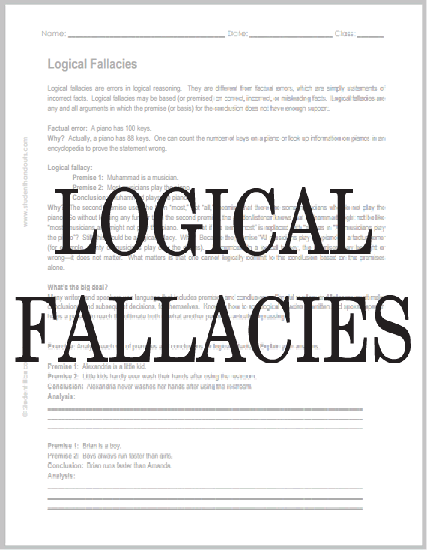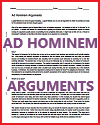| Logical Fallacies Worksheet |
|---|
| www.studenthandouts.com ↣ Social Studies ↣ Debate and Logic |
 |
    |
|
Logical fallacies are errors in logical reasoning. They are different from factual errors, which are simply statements of incorrect facts. Logical fallacies may be based (or premised) on correct, incorrect, or misleading facts. Logical fallacies are any and all arguments in which the premise (or basis) for the conclusion does not have enough support.
Factual error: A piano has 100 keys. Why? Actually, a piano has 88 keys. One can count the number of keys on a piano or look up information on pianos in an encyclopedia to prove the statement wrong. Logical fallacy: Premise 1: Muhammad is a musician. Premise 2: Most musicians play the piano. Conclusion: Muhammad plays the piano. Why? The second premise uses the term "most," not "all," meaning that there are some musicians who do not play the piano. So without looking any further than the second premise, the reader/listener knows that Muhammad might not be like "most" musicians and might not play the piano. But what if the term "most" is replaced with "all," as in "All musicians play the piano"? Still, this would be a logical fallacy. Why? Because the premise "All musicians play the piano" is a factual error (for example, plenty of musicians play only the drums). Remember: In a logical fallacy, the premises may be right or wrong—it does not matter. What matters is that one cannot logically commit to the conclusion based on the premises alone. What's the big deal? Many writers and speakers use language that includes premises and conclusions. Careful readers and listeners must make conclusions, and subsequent decisions, for themselves. Knowing how to spot logical fallacies in written and spoken speech helps a person to reach the ultimate truth of what another person is actually expressing. Click here to print. Click here for the answer key. |
| www.studenthandouts.com ↣ Social Studies ↣ Debate and Logic |














































